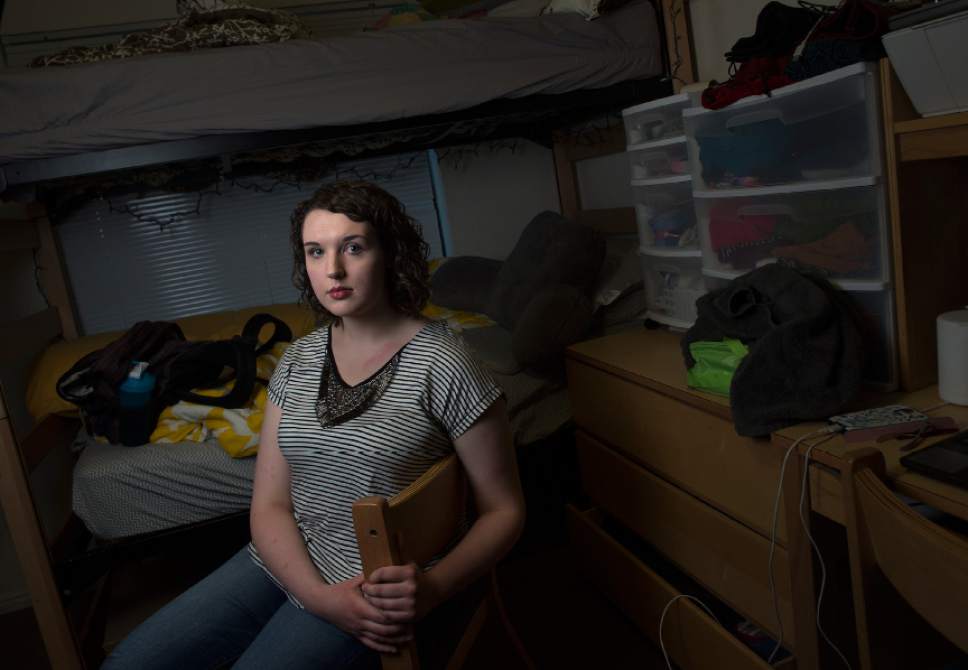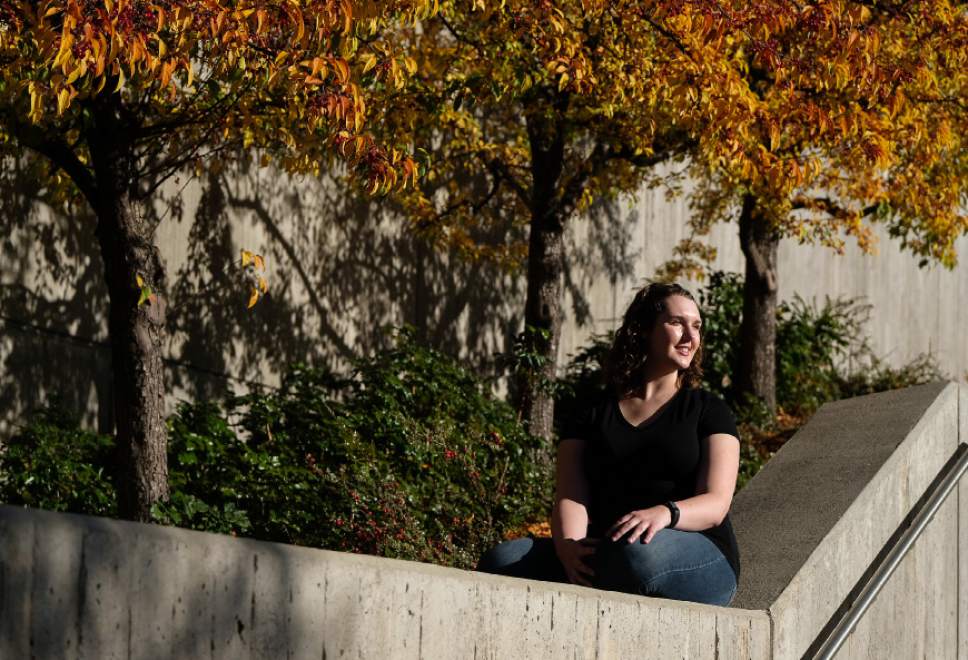This is an archived article that was published on sltrib.com in 2017, and information in the article may be outdated. It is provided only for personal research purposes and may not be reprinted.
In 2014, Brigham Young University freshman Madeline MacDonald was disappointed — and worried about possible future allegations — when Orem police told her no charges would be filed in her sexual-assault complaint against 19-year-old Samuel Butler.
She pressed police: "If he moves to like the other side of the country and something else happens again, will they be able to find this [report]?"
Orem and BYU officers assured MacDonald that Butler was "on everyone's radar" with his name "in the system." One officer said, "The data is all … very easy for communication."
But since then, three other women have accused Butler, now 21, of sexual assault in reports to Utah police departments. It appears that only in the most recent case did investigators connect the allegations.
"I'm very much upset that I reported him two years ago, and he's been running around [allegedly assaulting] women ever since," said MacDonald, who last year publicly described her assault and later being investigated by BYU under the LDS Church-owned school's Honor Code.
Samuel Heber Butler was charged last week in Washington County with first-degree felony rape in an assault reported by a Dixie State University student in January. Dixie State campus police sent inquiries about Butler to departments at or near campuses in Utah after Chief Don Reid interviewed him and suspected there may have been earlier accusations.
They found the three reports women made about Butler to investigators for Orem, Logan and the Utah County Sheriff's Office were similar to the Dixie State student's allegations.
In all four cases, the women said they first encountered Butler on online dating apps, Reid said. In the three cases in which police records have been provided to The Salt Lake Tribune, each woman reported that she had explicitly declined sex when Butler broached the topic early in the acquaintance.
The women said they met Butler believing the dates would be in public places but instead were taken or went somewhere secluded or private. Each woman said her assault began with kissing that quickly escalated to more intimate contact despite her protests.
Butler could not be reached for comment. A defense attorney who has appeared in court with Butler said he could not comment because he has not been retained.
Gary Cox, associate dean for Salt Lake Community College's criminal justice program, said there is no statewide "central clearinghouse" for officers to easily find people named in police reports but not arrested, prosecuted or convicted.
Showing a pattern of conduct may help a prosecution, he said, but circulating the name of a person accused but not charged "takes us down a dangerous path." He added: "To say there's a gap in the system, it depends."
But Elizabeth Bluhm, the sexual-assault advocacy coordinator at St. George's DOVE Center, said investigators should be more aggressive in searching for past reports because many sex-crime perpetrators establish a pattern of attacks. For victims, learning they are not the only one to accuse an individual can help them heal and give them courage to pursue charges, she said.
"Often, they are waffling, saying, 'I don't want to destroy somebody's life, he would never do that again, he's so sorry,' " she said. "But then if she [knew about other allegations] ... it would make a difference."
—
Case closed • MacDonald began having conversations with Butler on the dating app Tinder, where he told her "he was struggling with chastity issues but was trying to repent and be better, and I felt like I could be supportive of him," she later wrote in a statement for police, which she shared with The Tribune last year.
During their December 2014 date, MacDonald wrote, she told him that premarital sex was "a deal breaker."
"He was going to pick me up, and we were going to get hot chocolate or something," MacDonald said during a Trib Talk online broadcast in April 2016.
MacDonald said Butler instead took her to a water tower and trailhead with a parking lot that had views of Utah County. Inside his pickup truck, Butler repeatedly groped her over and under her clothes although she had protested and tried to push him away, she wrote in her statement.
When Butler drove MacDonald back to BYU, he told her he was "glad I was so firm in my standards otherwise we would have gone all the way and there would maybe have been violence," she wrote in her statement. "I felt violated by how he wouldn't take no for an answer."
MacDonald reported her alleged assault first to BYU's Title IX office, which is tasked by federal law to handle sex-crime complaints from students, and then to Orem police.
Officers from Orem and BYU later told her Butler would not be charged, MacDonald said, and she recorded the conversation. The Tribune offered to share the recording with BYU and Orem police for their review, but they declined.
On the recording, a man MacDonald identified as Orem police Detective Joshua Backus said he had not spoken with Butler.
But based on her statements, he said, he had asked county and city prosecutors about potential charges, and they had concerns.
Backus explained: "There was some participation on your part that I'm not saying was something that you wanted to happen, but it kind of still [inaudible]. On a moral standpoint ... what he did was wrong. ... He pushed things farther than you wanted it to go. ... On a criminal level, prosecutors still just don't feel that they have enough to push it."
Backus and the BYU officer, identified by MacDonald as Sgt. Elle Martin, then admonished her not to use Tinder and urged her to take a self-defense class.
When MacDonald asked whether other police departments would have access to her report, Martin replied: "Agencies could run a criminal history that pulls things from everywhere. ... Definitely in Utah County."
In an interview this week, Orem police Lt. Craig Martinez said prosecutors had declined to take on the case because there was not enough information to show Butler broke any state law, reasoning that MacDonald did not clearly indicate that the sexual contact was unwanted.
"She never said, 'Don't do this,' " he said.
However, in the written statement MacDonald sent to Backus, she said Butler repeatedly reached under her clothing despite her explicit verbal instructions to stop. She wrote that at times he prevented her from speaking by kissing her and tipping her head at an angle that temporarily prevented her from breathing, and said she eventually realized he was ignoring her protests.
—
Pursuing an interview • Butler was not a student at BYU — but the school opened an Honor Code investigation into MacDonald's conduct after she told the Title IX office she had been sexually assaulted.
Unlike police, Title IX investigator Melba Latu talked with Butler, an email from February 2015 shows. He described MacDonald saying "no," but he maintained he heeded her objection, Latu wrote.
Latu summarized his comments in a letter that frames Butler's response as "allegations" against MacDonald — a document label the school no longer uses, BYU spokeswoman Carri Jenkins confirmed Monday.
According to Latu's summary, Butler said MacDonald consented to the sexual contact. However, Latu's summary specifically notes that Butler indicated some degree of protest or struggle occurred, stating: "Madeline was not as vocal about her objections as she has made it out to be. Samuel was not as aggressive as Madeline has said he was. Samuel pushed, but when Madeline said, 'no,' he stopped."
BYU cleared MacDonald of violating the Honor Code, which bans premarital sex, regulates when and where unmarried men and women can visit one another in their homes, establishes a dress code, and forbids alcohol, tea, coffee and illicit drugs. The Title IX office determined MacDonald was a victim of sexual misconduct.
Jenkins said Monday that a Title IX investigation "is never done to determine an Honor Code violation by the victim."
MacDonald was among BYU students who last year urged the school to adopt an amnesty policy to protect students from investigation and discipline when they report sex crimes. The school, owned by The Church of Jesus Christ of Latter-day Saints, announced in October that it would immediately begin providing such amnesty, and a final written policy is still being reviewed, Jenkins said.
MacDonald, who no longer attends BYU, said it now appears to her that the school put more effort into investigating whether she had consensual sexual contact than Orem police put into investigating an accused abuser.
"I felt [Orem police] never felt urgency or much of a drive to investigate," she said.
—
Accusations in 2015, 2016 and 2017 • Three months after MacDonald's alleged assault, a Utah State University student told Logan police she met a man named Samuel Butler on MeetMe, an online dating site, and agreed to meet him March 17, 2015.
After they walked around campus, she said, she drove with him to a ranger station in Logan Canyon and parked, and they got into the back seat.
Eventually, she alleged, he raped her, although she had asked him to stop undressing her and touching her. She said she later "felt paralyzed and thought the only way to get Sam to stop was to just let him do what he wanted," the police report said.
She reported the alleged rape three days later. When police believed they had identified Butler months later, she looked through a photo lineup, but said she didn't see her assailant. She also said she did not want to testify or participate in any court proceedings, and asked for the case to be closed.
There is no indication in the report that Logan police discovered or told her about MacDonald's earlier case. Logan police have not responded to a request for comment.
The Tribune generally does not name sex assault victims; MacDonald has agreed to the use of her name.
A third woman accused Butler of sexual assault in Utah County in 2016 — but she also stopped cooperating, police say.
The woman said she met Butler on a dating app, Reid said, referring to a report his officers obtained from the Utah County Sheriff's Office. The Tribune has requested that report, but it has not received it.
Reid said Utah County's report does not indicate that detectives found or considered either of the two earlier sex assault accusations.
Utah County sheriff's Sgt. Spencer Cannon said Wednesday that he was "sure we knew about" MacDonald's report in Orem, but he said the cases were not connected to one another. He said investigators spoke with the alleged victim and Butler, but when the woman later stopped communicating with officers, "There was nothing more they can do."
In January, a Dixie State student told police she agreed to get coffee with Butler after talking with him on Tinder. He instead took her to his St. George apartment and eventually raped her, she says.
Spurred by Reid, his officers made phone calls to departments near campuses over several weeks and found the three earlier reports.
While Orem and Utah County don't plan to reopen their cases, Reid said Washington County officials will probe the previous allegations against Butler and may reinterview the alleged victims as they build their case.
Prosecutors "will want to show a mode of operation," he said.
Reid said interviewing Butler was key. As Butler described his dating experiences, the chief said, he had a hunch other allegations may have been made and asked Butler where he has lived in recent years.
"He said some things where I thought, 'You know what? This isn't the first time. This isn't the first time it's happened,' " Reid said.
— Reporters Courtney Tanner, Luke Ramseth and Mariah Noble contributed to this report





